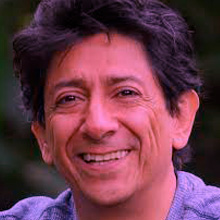El humorismo es una manera de ser
Rodrigo Xavier Bonilla Zapata (1964), más conocido por Bonil, es un caricaturista independiente ecuatoriano. Desde 1985 ha colaborado en revistas como Vistazo, Rocinante, gestión, Nuestro Mundo y otras más. Actualmente publica en el diario El Universo. Es miembro de la Asociación Internacional "Cartooning for Peace” y “CartonClub, el Club de la caricatura latina".
Ha publicado numerosos libros.
En 2015 fue nominado por IndexonCensorShip al "Freedom of Expression Award" por su labor de "más de 30 años criticando y satirizando a las autoridades de su país".
Durante su exitosa carrera ha obtenido muchos premios y distinciones como Primer Premio 56º International Cartoon Contest Golden Hat (Bélgica 2017); Mención de Honor “Human Rights Cartoons” (SIHG Brasil – 2016); 1er Premio “Toros Sí, Toreros No” (México, 2016); Mención de Honor (4th International Cartoon Contest, Sinaloa México (2015). (Hasta aquí premios que ha obtenido después de nuestra entrevista). Y sigo mencionando: Gram Premio SIP a la Libertad de Prensa (2015); Orden al Mérito por promover Derechos Humanos, especialmente Libertad de Expresión (Cámara de Comercio de Quito - 2014); Premio Especial de la SIP (2014); Primera Mención de Honor en la categoría Humor Libre de los Premios World Press Cartoon 2012, Portugal; Citation for Excelence in THE UNITED NATIONS RANAN LURIE POLITICAL CARTOON AWARDS (2012);
2º Premio "The Magic of IF..." 4º Festival de Mentes Brillantes (México, 2012); Primer Premio XXII Concurso de Periodismo “Jaime Mantilla Ortega” (Ecuador – 2012); Tercer Lugar 17th International Cartoon Contest "Diogenes Taborda" Tango (2012); Premio de Caricatura de la Sociedad Interamericana de Prensa (SIP) (2011); Premio SIP categoría CARICATURA (2011); World Language Contest (Donquichotte, 2008); Premio al Humor (El Comercio-Embajada Francia, 1993), entre otros.
Por todo ese contundente curriculum, porque es muy amable y porque soy admirador de su obra, lo invité a “dialocar” aquí y tuve el honor que aceptara.
Pues a conversar con Bonil entonces…
PP: Mi querido Bonil, ¿te gusta que te hagan entrevistas?
BONIL: Sí. Aunque a veces me releo y discrepo de algunas respuestas.
PP: Te pasa como a mí, a veces releo y discrepo de algunas preguntas. Pero así es la vida. Comienzo… ¿Cómo ves el estado actual del humor en Ecuador, en televisión, radio, teatro, literatura y gráfica?
BONIL: Lo veo en aprietos si se trata de humor político. Yo mismo he sido durante el año pasado, 2013, objeto de sanciones por parte del gobierno a causa de mis caricaturas. Pero además noto que algunas expresiones sociales satíricas que han sido tradicionales en mi país, han ido aminorando o edulcorándose. Me refiero a los “años viejos”, los monigotes que a fin de año la gente fabricaba y luego quemaba a las 12 de la noche. Sin embargo, hay también un humor que se expresa respecto a la cotidianidad. Por ejemplo, en televisión se repiten las comedias con la familia como fuente de situaciones humorísticas, o programas de humor situacional que hoy son objeto de denuncias por “discriminación de género”, o por supuesto racismo.
PP: Bueno, eso sucede en toda latinoamérica, a mi entender. Por un lado la falta de educación de calidad hace que suba el mal gusto y tenemos suerte si nos bombardean con humor costumbrista, porque a veces el que impera es el vulgar. Y por otro lado es difícil hacer humor con esa dictadura de lo políticamente correcto que cada día se hace más fuerte. Y también lo que te ocurrió la censura y represión a la sátira política de las autoridades. En fin, que se está convirtiendo la profesión de humorista en una actividad de alto riesgo, ja, ja… Bueno, seguimos. En varios países de América Latina se dice: "Mi país es un pueblo de humoristas", "En mi país, tú mueves una piedra y sale un humorista", etc. ¿En Ecuador se dice lo mismo?
BONIL: Cierto es que hay quienes llaman “insecto” a algunos humoristas, pero no tanto como para levantar una piedra y encontrarlos… Más se dice que hay pintores y poetas. Sin embargo el humor es una expresión latente en la vida cotidiana, al igual que cualquier pueblo del mundo.
PP: Para ti, ¿es verdad la repetida frase: "Es más fácil hacer llorar que hacer reír”?
BONIL: Nunca he intentado hacer llorar, y tampoco he “procurado” hacer reír. Creo que para quien no lo lleva naturalmente cualquier posibilidad expresiva puede resultar difícil de lograr. Ahora, si me dijeran tus caricaturas “son de llorar”… no sabría si reír o llorar. Y sería harto difícil en ambos casos…
PP: Disculpa, pero si haces caricatura, por lo menos tienes la intención de hacer sonreír. Y lo logras. De lo contrario nadie te dijera humorista, ¿no es cierto? Otra cosa es que no dibujes para conseguir solo una risa o una sonrisa, porque sé que te interesa hacer pensar también. Según mi opinión, se provoca pensar más en un tema cuando lo tratas con humor que con gravedad. Llama más la atención. Por eso, según mi humilde criterio, repito, es más difícil el humor que el drama o la tragedia. Hay que elaborar más. Además, los dramas y las tragedias abundan más en la vida. Pero bueno, el tema da para debatir y no es el momento. Debemos continuar. Por ejemplo, te pregunto algo más personal: ¿cuándo decidiste hacerte humorista?
BONIL: Aún no lo soy. Yo miro al Humorismo como una disciplina mental, artística y filosófica que tiene que ver con una actitud vital. No consiste en aprenderse chistes. Así como al beato le surge el “¡Dios mío”!, al Humorista le aflora naturalmente el humor.
PP: Vuelvo a discrepar contigo. Pienso que eres un humorista y buenísimo. Estás en lo correcto al definir así al Humorismo. Y como esa hay muchas más definciones. Por ejemplo, que el humor es tragedia más tiempo, o una disposión de ánimo, etc., etc. Y todas tienen razón. Pero el humor, para mí, es la expresión de lo cómico. Y al crearlo, a esa intención de hacer reír o sonreír, le agregas los condimkentos para pensar, para criticar, para tener una intención artística y filosófica, como bien dices. Ya sé que es un tema debatible, y que aún no nos ponemos de acuerdo en lo teórico. Pero hace humor desde un payaso cayéndose para hacer reír a un niño, hasta el gran intelectual que nos provoca una sonrisa interior con un mensaje importante. Así que para mí, no sé cuándo decidiste hacerte humorista, pero de que lo eres, lo eres. Ojalá tuviéramos más oportunidad para reflexionar ambos sobre este punto. Y siguiendo esta línea, según tu opinión, ¿el humorista nace o se hace?
BONIL: Yo creo que “se hace”. Porque si fuera al nacer, la primera nalgada le extraería una risa y no un alarido.
PP: Buen punto. Ahora sigamos contigo. ¿Cuál ha sido el mejor y el peor momento de su carrera hasta el día de hoy?
BONIL: Al mismo tiempo ha sido el impasse con el Presidente de la República por un dibujo mío. Puso a prueba mi convicción de que el humorismo es mi lenguaje. Respondí desde el humor a una coyuntura de estigmatización y castigo proveniente del aparato del estado. Mi dibujo no fue el mejor, pero fue la oportunidad que encontró Rafael Correa para cobrármela por mis otros dibujos.
PP: Me imaginé que ese sería tu peor momento. A todos nos indignó lo que te hicieron. Pero así son ciertos gobernantes. Me alegro que pienses que el humorismo es tu lenguaje. ¿Ves? Eres humorista y no lo dices por modestia. Pero esa arma que sale de tu pluma es muy efectiva contra la mala autoridad. Si no fuera así, no hubieras tenido ese mal momento. Te felicito, amigo mío, porque además de talento, tienes coraje para enfrentarte al poder. Pero pasemos a algo más “ligero” para equilibrar. Como profesional del humor, ¿te ríes fácil? ¿Con qué tipo de chistes?
BONIL: Yo no me siento un “profesional” del humor. El Humorismo es una manera de ser. No siempre encontraremos risa, aquella reacción sonora, explosiva, pero hallaremos humor. Milan Kundera, Juan José Arreola, Monterroso y tantísimos otros escritores nos brindan página de humorismo. Igualmente, en el humor gráfico encontramos ese humor silencioso que disfruto tanto, pero quizá hay otro más efervescente, festivo. Me gusta Hervi, también Montt. Fontanarrosa que marcó un estilo. Quino no digamos. Hay un tipo de humor, el de MAD, de Sergio Aragonés, muy divertido. Sempé es otro a quien disfruto mucho, pero también al polaco Bartak.
PP: De nuevo la modestia. Ya te expliqué lo que pienso sobre ese tema. Para mí eres un grande del humor latinoamericano, porque para mí, insisto, el humor va de la simple y expresiva carcajada hasta la sonrisa interior producida por un pensamiento, una emoción. En fin, cambio de rumbo otra vez… ¿nos puedes contar alguna anécdota relacionada con nuestra profesión?
BONIL: Cuando me inicié en este oficio era muy joven y en varias ocasiones que me entrevistaban, me ignoraban al principio porque pensaban que yo era el secretario o mensajero de Bonil. Siempre pensaban que yo era un viejo calvo, barrigón. Desde entonces han pasado 30 años y no estoy muy lejos de eso, pero en cuanto a edad sí, aunque más bien me conservo flaco. Pero este tiempo me ha servido para fortalecer un oficio y una convicción, que es lo que me ha permitido sobrellevar el constante ataque de un gobierno.
PP: Es cierto, a varios colegas le ha pasado que los editores, por ejemplo, ven la obra, miran la firma y se dan una idea, muchas veces errónea, del creador. Incluso hay quienes piensan en un hombre y la dibujante es una mujer. Característica del oficio del humorista gráfico, ¿no? Ya adelantaste algo, pero dime, ¿con cuáles colegas te identificas?
BONIL: Guardo amistad y admiración por muchos colegas. En 2012 organicé un encuentro internacional de humor gráfico en mi país e invité a Boligán, Ares, Paulo Caruso, Hervi, Jean Plantu, y otros. He participado de otros y conocer personalmente a los amigos afianza ese sentido de “familia” que parece que nos sobrelleva a todos.
PP: ¿Cómo? ¿Invitas a humoristas? ¿Entonces eres humorista? E invitas a reconocidísimos humoristas, y asisten, ¿significa que te tienen como un par? ¿Crees que si no fueras humorista irían?, ja, ja… Te estoy haciendo “burling”, como dice una nieta mía. Pues te diré que Hervi, Boligán y Ares son grandes amigos míos. Les preguntaré qué opinan. Bueno, para ir cerrando, ¿qué le aconsejarías a un humorista? Por ejemplo, a mí
BONIL: ¡Por Dios, que no leas esta entrevista…!
PP: Ja, ja… Gracias, querido Bonil, por tu tiempo y atención. Te deseo lo mejor y que sigan llegando los éxitos. Ah, y recuerda que los políticos pasan, pero el humorista queda y sigue con su látigo con cascabeles en la punta, como decía José Martí. Un abrazo, amigo mío.
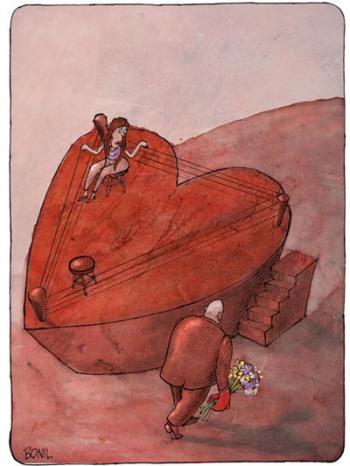
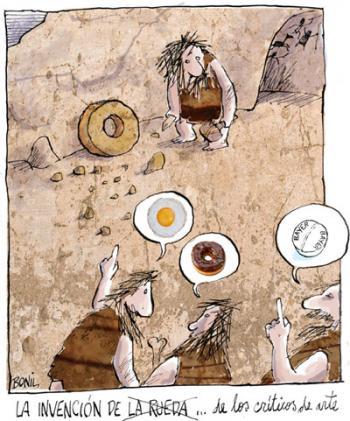
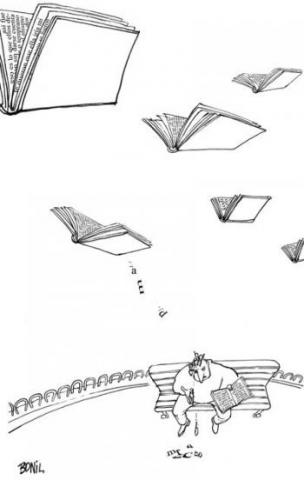
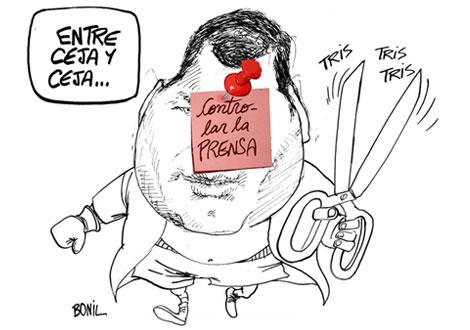
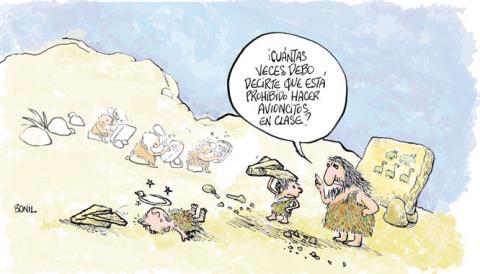
Interview with Bonil
By Pepe Pelayo
Humor is a way of being
Rodrigo Xavier Bonilla Zapata (1964), better known as Bonil, is an Ecuadorian independent cartoonist. Since 1985 he has collaborated in magazines such as Vistazo, Rocinante, Gestión, Nuestro Mundo and others. He currently publishes in the newspaper El Universo. He is a member of the International Association "Cartooning for Peace" and "CartonClub, the Latin Caricature Club."
He has published numerous books.
In 2015 he was nominated by IndexonCensorShip for the "Freedom of Expression Award" for his work of "more than 30 years criticizing and satirizing the authorities of his country."
During his successful career he has obtained many awards and distinctions such as First Prize 56th International Cartoon Contest Golden Hat (Belgium 2017); Honorable Mention “Human Rights Cartoons” (SIHG Brazil – 2016); 1st Prize “Toros Yes, Bullfighters No” (Mexico, 2016); Honorable Mention (4th International Cartoon Contest, Sinaloa México (2015). (So much for awards he has obtained after our interview). And I continue to mention: SIP Gram Award for Press Freedom (2015); Order of Merit for promoting Rights Human Rights, especially Freedom of Expression (Quito Chamber of Commerce - 2014); IAPA Special Award (2014); First Honorable Mention in the Free Humor category of the 2012 World Press Cartoon Awards, Portugal; Citation for Excellence in THE UNITED NATIONS RANAN LURIE POLITICAL CARTOON AWARDS (2012);
2nd Prize "The Magic of IF..." 4th Festival of Brilliant Minds (Mexico, 2012); First Prize XXII “Jaime Mantilla Ortega” Journalism Contest (Ecuador – 2012); Third Place 17th International Cartoon Contest "Diogenes Taborda" Tango (2012); Cartoon Award from the Inter-American Press Association (IAPA) (2011); SIP CARTOON category award (2011); World Language Contest (Donquichotte, 2008); Humor Award (El Comercio-French Embassy, 1993), among others.
Because of all that compelling resume, because he is very kind and because I am an admirer of his work, I invited him to “discuss” here and I was honored that he accepted.
Well, let's talk to Bonil then...
PP: My dear Bonil, do you like being interviewed?
BONIL: Yes. Although sometimes I reread it and disagree with some answers.
PP: It happens to you like me, sometimes I reread and disagree with some questions. But that's life. Start… How do you see the current state of humor in Ecuador, on television, radio, theater, literature and graphics?
BONIL: I see it in trouble if it is about political humor. During the past year, 2013, I myself have been subject to sanctions by the government because of my cartoons. But I also notice that some satirical social expressions that have been traditional in my country have been diminished or sweetened. I am referring to the “old years”, the puppets that at the end of the year people made and then burned at midnight. However, there is also a humor that is expressed regarding everyday life. For example, comedies with the family are repeated on television as a source of humorous situations, or situational humor programs that today are the subject of complaints for “gender discrimination,” or of course racism.
PP: Well, that happens throughout Latin America, in my opinion. On the one hand, the lack of quality education increases bad taste and we are lucky if we are bombarded with traditional humor, because sometimes vulgar humor prevails. And on the other hand, it is difficult to make humor with that dictatorship of political correctness that grows stronger every day. And also what happened to you, the censorship and repression of political satire by the authorities. Anyway, the profession of comedian is becoming a high-risk activity, ha, ha... Well, let's continue. In several Latin American countries it is said: "My country is a town of comedians", "In my country, you move a stone and a comedian comes out", etc. In Ecuador they say the same thing?
BONIL: It is true that there are those who call some comedians an “insect”, but not enough to lift a stone and find them… More it is said that there are painters and poets. However, humor is a latent expression in everyday life, like any people in the world.
PP: For you, is the repeated phrase true: "It is easier to make people cry than to make them laugh"?
BONIL: I have never tried to make people cry, nor have I “tried” to make them laugh. I think that for those who do not have it naturally, any expressive possibility can be difficult to achieve. Now, if they told me your cartoons “make you cry”… I wouldn't know whether to laugh or cry. And it would be very difficult in both cases...
PP: Excuse me, but if you make a cartoon, at least you have the intention of making people smile. And you achieve it. Otherwise no one would call you a comedian, right? Another thing is that you don't draw just to get a laugh or a smile, because I know that you are interested in making people think too. In my opinion, it provokes more thinking about a topic when you treat it with humor than with gravity. It draws more attention. That is why, in my humble opinion, I repeat, humor is more difficult than drama or tragedy. We have to elaborate more. Furthermore, dramas and tragedies are more abundant in life. But hey, the topic is up for debate and now is not the time. We must continue. For example, I ask you something more personal: when did you decide to become a comedian?
BONIL: I'm not yet. I look at Humorism as a mental, artistic and philosophical discipline that has to do with a vital attitude. It's not about learning jokes. Just as the blessed person says “My God!”, humor naturally emerges in the Humorist.
PP: I disagree with you again. I think you are a comedian and a very good one. You are correct in defining Humorism this way. And there are many more definitions like that. For example, that humor is tragedy longer, or a mood, etc., etc. And they are all right. But humor, for me, is the expression of the comic. And when you create it, to that intention of making people laugh or smile, you add the seasonings to think, to criticize, to have an artistic and philosophical intention, as you say. I already know that it is a debatable topic, and that we still do not agree on the theoretical. But he makes humor from a clown falling to make a child laugh, to the great intellectual who makes us smile internally with an important message. So for me, I don't know when you decided to become a comedian, but you are, you are. I wish we both had more opportunity to reflect on this point. And following this line, in your opinion, is a comedian born or made?
BONIL: I believe that “it is done.” Because if it were at birth, the first spanking would make him laugh and not scream.
PP: Good point. Now let's continue with you. What has been the best and worst moment of your career to date?
BONIL: At the same time there has been the impasse with the President of the Republic over a drawing of mine. It tested my conviction that humor is my language. I responded with humor to a situation of stigmatization and punishment coming from the state apparatus. My drawing was not the best, but it was the opportunity that Rafael Correa found to charge me for my other drawings.
PP: I figured that would be your worst moment. We were all outraged by what they did to you. But that's how certain rulers are. I'm glad you think that humor is your language. You see? You are a comedian and you don't say it out of modesty. But that weapon that comes from your pen is very effective against bad authority. If it weren't like that, you wouldn't have had that bad moment. I congratulate you, my friend, because in addition to talent, you have courage to face power. But let's move on to something “lighter” to balance. As a humor professional, do you laugh easily? With what kind of jokes?
BONIL: I don't feel like a “professional” in humor. Humor is a way of being. We will not always find laughter, that loud, explosive reaction, but we will find humor. Milan Kundera, Juan José Arreola, Monterroso and many other writers provide us with a page of humor. Likewise, in graphic humor we find that silent humor that I enjoy so much, but perhaps there is another more effervescent, festive one. I like Hervi, also Montt. Fontanarrosa that marked a style. Let's not say Quino. There is a type of humor, that of MAD, by Sergio Aragonés, very funny. Sempé is another one I really enjoy, but also the Polish Bartak.
PP: Modesty again. I already explained to you what I think about that topic. For me you are a great Latin American humorist, because for me, I insist, humor ranges from the simple and expressive laugh to the inner smile produced by a thought, an emotion. Anyway, change of course again... can you tell us an anecdote related to our profession?
BONIL: When I started in this profession I was very young and on several occasions when they interviewed me, they ignored me at first because they thought I was Bonil's secretary or messenger. They always thought I was a bald, paunchy old man. Since then 30 years have passed and I am not very far from that, but in terms of age yes, although I am rather skinny. But this time has helped me strengthen a profession and a conviction, which is what has allowed me to endure the constant attack of a government.
PP: It's true, it has happened to several colleagues that editors, for example, see the work, look at the signature and get an idea, often wrong, of the creator. There are even those who think of a man and the artist is a woman. Characteristic of the graphic humorist's job, right? You already advanced something, but tell me, which colleagues do you identify with?
BONIL: I have friendship and admiration for many colleagues. In 2012 I organized an international meeting of graphic humor in my country and invited Boligan, Ares, Paulo Caruso, Hervi, Jean Plantu, and others. I have participated in others and knowing friends personally strengthens that sense of “family” that seems to overcome us all.
PP: How? Do you invite comedians? So you're a comedian? And you invite very well-known comedians, and they attend, does that mean they have you as a peer? Do you think that if you weren't a comedian they would go? Ha, ha... I'm making fun of you, as one of my granddaughters says. Well, I'll tell you that Hervi, Boligan and Ares are great friends of mine. I'll ask them what they think. Well, to close, what would you advise a comedian? For example, to me
BONIL: For God's sake, don't read this interview...!
PP: Ha, ha… Thank you, dear Bonil, for your time and attention. I wish you the best and may the successes continue to come. Oh, and remember that the politicians pass, but the comedian stays and continues with his whip with bells on the end, as José Martí said. A hug my friend.
(This text has been translated into English by Google Translate)

